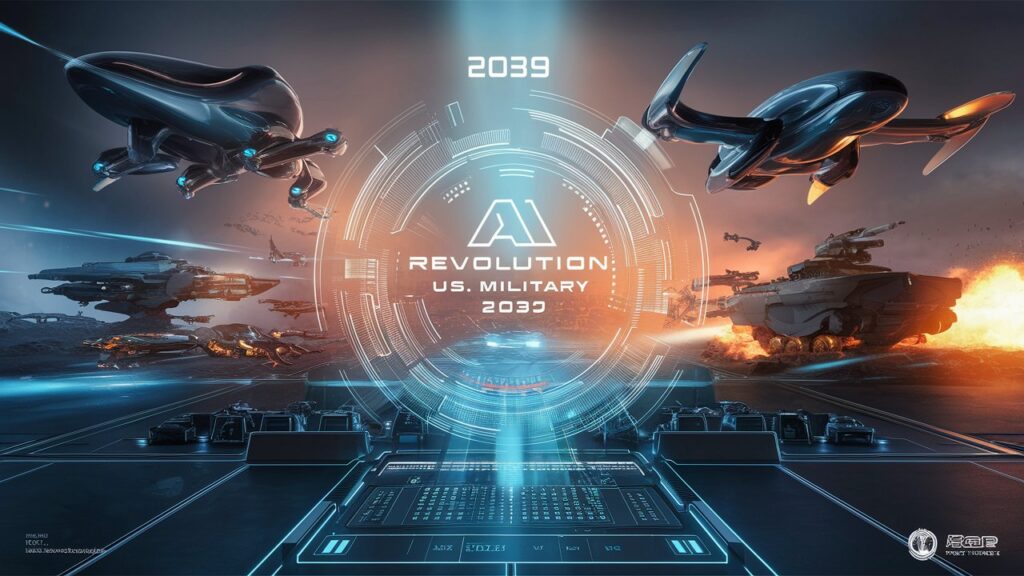AI in Military: The Future of Warfare
Artificial Intelligence is revolutionizing military operations, enhancing capabilities and efficiency.
🤖 AI-Powered Robots
One-third of U.S. military forces to be robotic by 2039, leveraging AI for enhanced capabilities.
🚁 Autonomous Vehicles
AI-controlled drones to increase surveillance and intelligence gathering, improving operations.
🛡️ Enhanced Armor
AI-integrated armor systems to enhance protection, awareness, and combat effectiveness.
⚡ Increased Efficiency
AI algorithms to streamline decision-making, reduce risks, and optimize military missions.
🌐 Global Adoption
Military robot market expected to reach $32.7 billion by 2030, driven by AI technologies.
As AI continues to evolve, it will play an increasingly crucial role in shaping the future of military operations and global security.
AI in the U.S. Military: Revolutionizing Warfare by 2039
In an era where technological advancements are reshaping every aspect of our lives, the integration of Artificial Intelligence (AI) into military operations is becoming an increasingly hot topic. Recent predictions by retired Army General Mark Milley have sparked intense discussions about the future of warfare and the role of AI in shaping military strategies. This article explores the potential impact of AI on the U.S. military, its implications for global defense, and the ethical considerations that come with this technological revolution.
The AI Revolution in Military Operations
Retired Army General Mark Milley’s recent statement has sent shockwaves through the defense community. According to Milley, within the next 10 to 15 years, a staggering 25-33% of the U.S. military could be composed of robotic systems managed by AI. This prediction paints a picture of a dramatically transformed military landscape by 2039.
Key Aspects of AI Integration in the U.S. Military
- Robotic Systems: The incorporation of AI-managed robotic systems is expected to significantly alter the composition of military forces.
- UAVs (Unmanned Aerial Vehicles): AI-driven UAVs, similar to those used in the Ukraine conflict, are likely to play a crucial role.
- Decision-Making Processes: AI could enhance strategic planning and tactical decision-making.
- Efficiency and Precision: AI integration aims to improve operational efficiency and precision in military actions.
- Human-Machine Collaboration: The future military will likely see increased collaboration between human soldiers and AI-powered systems.
The Timeline: AI Military Integration by 2039
General Milley’s prediction sets a clear timeline for the transformation of the U.S. military. By 2039-2044, we could see a significant portion of military operations handled by AI systems. This shift represents a fundamental change in the nature of warfare and military strategy.
Milestones in AI Military Integration
- 2024-2029: Initial integration of AI systems in non-combat roles
- 2029-2034: Expansion of AI into tactical decision-making and combat support
- 2034-2039: Large-scale deployment of AI-managed robotic systems
- 2039-2044: Potential achievement of 25-33% AI integration in the U.S. military
Global Implications of AI in Military Operations

The U.S. is not alone in its pursuit of AI-enhanced military capabilities. Countries worldwide are investing heavily in AI technologies for defense purposes.
International AI Military Initiatives
- Europe’s Combat Jet Program: Incorporating AI technologies in next-generation fighter jets
- China’s AI Strategy: Significant investments in AI for military applications
- Russia’s Autonomous Weapons: Development of AI-powered autonomous weapon systems
- Israel’s AI Defense Systems: Integration of AI in missile defense and border security
These global developments indicate a shift towards AI-centric defense strategies, potentially leading to a new arms race focused on artificial intelligence.
The Impact of AI on Military Strategies

The integration of AI into military operations is set to revolutionize traditional warfare strategies. Here’s how AI could transform military tactics:
- Enhanced Situational Awareness: AI systems can process vast amounts of data in real-time, providing commanders with unprecedented insights.
- Predictive Analysis: AI algorithms can predict enemy movements and strategies, allowing for proactive rather than reactive military planning.
- Autonomous Operations: AI-powered robots and drones can perform high-risk missions without putting human lives in danger.
- Cyber Warfare: AI will play a crucial role in both offensive and defensive cyber operations.
- Logistics and Supply Chain Optimization: AI can streamline military logistics, ensuring efficient resource allocation and management.
Ethical Considerations and Challenges
While the potential benefits of AI in military operations are significant, they come with a host of ethical concerns and challenges.
Key Ethical Issues
- Autonomous Weapons: The development of fully autonomous weapons raises questions about accountability and the moral implications of machines making life-or-death decisions.
- Data Privacy: The use of AI in military operations involves processing vast amounts of sensitive data, raising concerns about privacy and data security.
- Bias in AI Systems: Ensuring that AI systems are free from biases that could lead to discriminatory or unfair actions in military operations.
- Human Oversight: Maintaining meaningful human control over AI systems in critical military decisions.
- International Laws and Regulations: The need for new international agreements and laws to govern the use of AI in warfare.
The Importance of Ethical Frameworks
General Milley emphasizes the critical need for robust ethical frameworks to guide the integration of AI into military operations. These frameworks must address:
- Responsibility and Accountability: Clearly defining who is responsible for the actions of AI systems in military operations.
- Transparency: Ensuring that the decision-making processes of AI systems are transparent and can be audited.
- Human Rights: Safeguarding human rights and dignity in AI-driven military operations.
- International Cooperation: Fostering global collaboration to establish common ethical standards for military AI use.
The Role of Human Soldiers in an AI-Integrated Military
As AI takes on a more significant role in military operations, the role of human soldiers will inevitably evolve. Here’s how the human element in the military might change:
- Shift to High-Level Decision Making: Human soldiers may focus more on strategic planning and oversight of AI systems.
- Technical Expertise: Increased demand for soldiers with technical skills to manage and maintain AI systems.
- Ethical Decision Making: Human soldiers will play a crucial role in making ethical judgments that AI systems cannot handle.
- Human-Machine Teaming: Development of new tactics and strategies that leverage the strengths of both human soldiers and AI systems.
The Future of Warfare: AI-Human Collaboration
The future of warfare is likely to be characterized by close collaboration between AI systems and human soldiers. This synergy could lead to:
- Enhanced Combat Effectiveness: Combining human intuition with AI’s data processing capabilities.
- Reduced Casualties: AI systems taking on high-risk tasks to minimize human casualties.
- Rapid Decision Making: AI assisting human commanders in making quick, informed decisions in complex scenarios.
- Adaptive Strategies: AI systems helping to develop and implement adaptive strategies in real-time.
Economic Implications of Military AI Integration
The integration of AI into military operations will have significant economic implications:
- Defense Spending: Increased investment in AI research and development for military applications.
- Job Market Changes: Shift in military job requirements towards technical and AI-related skills.
- Defense Industry Transformation: Companies focusing on AI and robotics will play a larger role in the defense industry.
- Spin-off Technologies: Military AI advancements could lead to innovations in civilian sectors.
Preparing for an AI-Integrated Military Future
As we move towards an AI-integrated military future, several key steps need to be taken:
- Education and Training: Developing new training programs for soldiers to work effectively with AI systems.
- Policy Development: Creating comprehensive policies to govern the use of AI in military operations.
- International Dialogue: Engaging in global discussions to establish norms and regulations for military AI use.
- Public Awareness: Educating the public about the implications of AI in military operations to foster informed debates.
Conclusion: Navigating the AI Military Revolution
The integration of AI into the U.S. military represents a paradigm shift in warfare and defense strategies. While it offers immense potential for enhancing military capabilities, it also presents significant ethical and strategic challenges. As we move towards 2039 and beyond, it is crucial that we approach this technological revolution with careful consideration, robust ethical frameworks, and international cooperation. One of the key ways to address the challenges of AI integration in the military is by enhancing students’ skills for the future, particularly in the fields of AI development, cybersecurity, and ethical decision-making. By equipping our next generation with the knowledge and tools to navigate the complexities of AI in warfare, we can ensure that they are prepared to uphold ethical standards and make informed strategic decisions. Additionally, fostering international cooperation and dialogue on the ethical and strategic implications of AI in the military will be essential in guiding the development and deployment of this transformative technology.
The future of warfare is undoubtedly intertwined with artificial intelligence. How we navigate this new terrain will not only shape the future of military operations but also have far-reaching implications for global security, international relations, and the very nature of conflict in the 21st century.
As we stand on the brink of this AI military revolution, it is imperative that we engage in thoughtful discussions, rigorous ethical analyses, and proactive policy-making. Only through these efforts can we ensure that the integration of AI into military operations serves to enhance global security and stability, rather than escalate conflicts or compromise human values.
The journey towards an AI-integrated military is just beginning, and its success will depend on our ability to balance technological advancement with ethical considerations and human oversight. As we move forward, let us approach this new era of warfare with wisdom, foresight, and a commitment to using technology for the greater good of humanity.







